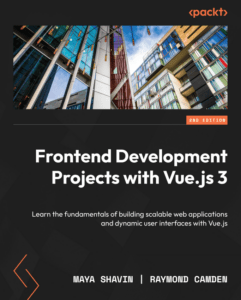Raymond Camden is the author of Frontend Development Projects with Vue.js 3 we got the chance to sit down with him and find out more about his experience of writing with Packt.
Q: How did you become an author for Packt? Tell us about your journey. What was your motivation for writing this book?
Raymond: I began years ago working on a jQuery Mobile book, and have had other contributions since then. For this book, as it was an update, the motivation was to show what’s new with Vue 3.
Q: What is the name of your book?
Raymond: Frontend Development Projects with Vue.js 3: Learn the fundamentals of building scalable web applications and dynamic user interfaces with Vue.js, 2nd Edition
Q: What kind of research did you do, and how long did you spend researching before beginning the book?
Raymond: I spent lots of time reading the docs across Vue and other related projects.
Q: Do you have a blog that readers can follow?
Raymond: https://www.raymondcamden.com
Q: What key takeaways do you want readers to come away with from the book?
Raymond: Basically how to get started building web applications with Vue, and from there, how to get them live, add testing and CI/CD.
Q: Can you share any blogs, websites and forums to help readers gain a holistic view of the tech they are learning?
Raymond: Honestly, I’d start at the Vue docs: https://vuejs.org/guide/introduction.html
Q. Did you face any challenges during the writing process? How did you overcome them?
Raymond: As usual with tech, some things didn’t work at first, so I had to hit up a few Discords to get help, and in general I was pretty successful with that.
Q. How would you describe your author journey with Packt? Would you recommend Packt to aspiring authors?
Raymond: As a publisher, Packt is incredibly easy to work with and is understanding when schedules need to adjust due to life’s fun little emergencies.
Q. Why should readers choose this book over others already on the market? How would you differentiate your book from its competition?
Raymond: I think our book has a friendly, simple introduction to a wide range of topics for working with Vue, including things like deployment and testing.
Q. What is/are your specialist tech area(s)?
Raymond: Web Development, Serverless, APIs, enterprise cat demos.
Q. What advice would you give to readers jumping into this technology? Do you have any top tips?
Raymond: Start slow, and learn one thing at a time. Build a lot of simple demos as a way to practice.
Q. What’s your take on the technologies discussed in the book? Where do you see these technologies heading in the future?
Raymond: Vue continues to innovate and improve. Vue 3 was a long time coming and you can absolutely see it was necessary due to the scope of changes.
Q. How did you organize, plan, and prioritize your work and write the book?
Raymond: I use Evernote and keep notes about my outlines, schedule, etc.
Q. What are your favorite tech journals? How do you keep yourself up to date on tech?
Raymond: I subscribe to many newsletters from Cooper Press: https://cooperpress.com/
Q. Would you like to share your social handles? If so, mention them below.
Raymond: Please find me on Twitter @raymondcamden and @raymondcamden.com on Mastodon.
Q: What is that one writing tip that you found most crucial and would like to share with aspiring authors?
Raymond: If you can, hire an editor. If not, use Grammarly.
You can find Raymond’s book on Amazon by following this link: Please click here









